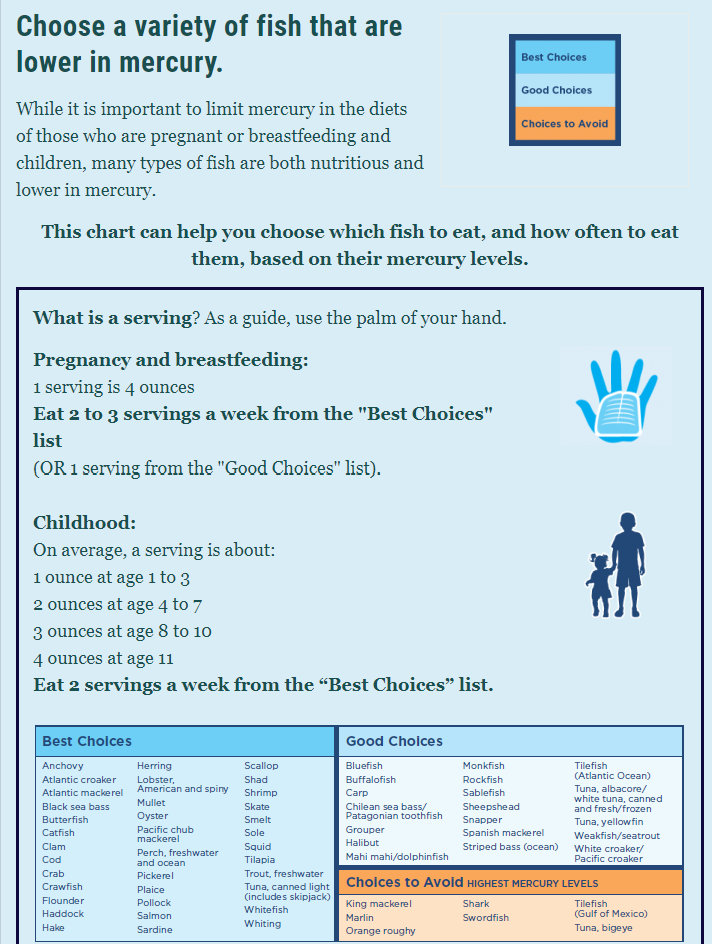
Original Launch Date: 5.28.24
Expiration Date: 5.28.26
ACCME PARS: 3998
This activity is intended for healthcare providers delivering care to women and their families.
After completing this activity, the participant should be better able to:
1. Counsel a patient regarding fish consumption during pregnancy
2. Restate the foods to avoid as they pertain to Listeria
Estimated time to complete activity: 0.25 hours
Postgraduate Institute for Medicine (PIM) requires faculty, planners, and others in control of educational content to disclose all their financial relationships with ineligible companies. All identified conflicts of interest (COI) are thoroughly vetted and mitigated according to PIM policy. PIM is committed to providing its learners with high quality accredited continuing education activities and related materials that promote improvements or quality in healthcare and not a specific proprietary business interest of an ineligible company.
The PIM planners and others have nothing to disclose. The OBG Project planners and others have nothing to disclose.
Faculty: Susan J. Gross, MD, receives consulting fees from Cradle Genomics.
Planners and Managers: PIM Planners have nothing to disclose
Participants must read the learning objectives and faculty disclosures and study the educational activity.
If you wish to receive acknowledgment for completing this activity, please complete the test and evaluation. Upon registering and successfully completing the test with a score of 100% and the activity evaluation, your certificate will be made available immediately.

In support of improving patient care, this activity has been planned and implemented by the Postgraduate Institute for Medicine and The ObG Project. Postgraduate Institute for Medicine is jointly accredited by the Accreditation Council for Continuing Medical Education (ACCME), the Accreditation Council for Pharmacy Education (ACPE), and the American Nurses Credentialing Center (ANCC), to provide continuing education for the healthcare team.
Postgraduate Institute for Medicine designates this enduring material for a maximum of 0.25 AMA PRA Category 1 Credit(s)™. Physicians should claim only the credit commensurate with the extent of their participation in the activity.
The maximum number of hours awarded for this Continuing Nursing Education activity is 0.2 contact hours.
Read Disclaimer & Fine PrintIn July 2019, the FDA revised its advice on fish consumption for women who are pregnant, considering pregnancy, breastfeeding or have young children. The FDA continues to encourage women to eat fish, 2-3 servings of lower-mercury fish per week (or 8 to 12 ounces). In addition, the fish chart remains unchanged. However, there is concern that women may be limiting their diets due to mercury concerns. The purpose of this revision is to highlight benefits of fish consumption. The FDA states that
The FDA’s revised advice highlights the many nutrients found in fish, several of which have important roles in growth and development during pregnancy and early childhood. It also highlights the potential health benefits of eating fish as part of a healthy eating pattern, particularly for improving heart health and lowering the risk of obesity.
Note: ACOG has also released a practice advisory in support of the FDA and EPA guidance with an important addition
“Recommendations for women of childbearing age (about 16-49 years old), especially pregnant and breastfeeding women, and for parents and caregivers of young children”
The FDA and EPA fish chart covers 62 types of fish and recommendations for consumption are based on the following categories
Note: The chart also includes a category titled “Choices to Avoid” due to highest mercury levels

FDA In Brief: FDA revises 2017 fish advice for pregnant and breastfeeding mothers and young children
ACOG Committee Opinion 832: Reducing Prenatal Exposure to Toxic Environmental Agents
Take a post-test and get CME credits
TAKE THE POST TESTAre you an
ObG Insider?
Get specially curated clinical summaries delivered to your inbox every week for free
Please log in to ObGFirst to access this page
OBG Project CME requires a modern web browser (Internet Explorer 10+, Mozilla Firefox, Apple Safari, Google Chrome, Microsoft Edge). Certain educational activities may require additional software to view multimedia, presentation, or printable versions of their content. These activities will be marked as such and will provide links to the required software. That software may be: Adobe Flash, Apple QuickTime, Adobe Acrobat, Microsoft PowerPoint, Windows Media Player, or Real Networks Real One Player.
This educational activity may contain discussion of published and/or investigational uses of agents that are not indicated by the FDA. The planners of this activity do not recommend the use of any agent outside of the labeled indications.
The opinions expressed in the educational activity are those of the faculty and do not necessarily represent the views of the planners. Please refer to the official prescribing information for each product for discussion of approved indications, contraindications, and warnings.
Participants have an implied responsibility to use the newly acquired information to enhance patient outcomes and their own professional development. The information
presented in this activity is not meant to serve as a guideline for patient management. Any procedures, medications, or other courses of diagnosis or treatment discussed or suggested in this activity should not be used by clinicians without evaluation of their patient’s conditions and possible contraindications and/or dangers in use, review of any applicable manufacturer’s product information, and comparison with recommendations of other authorities.
It appears you don't have enough CME Hours to take this Post-Test. Feel free to buy additional CME hours or upgrade your current CME subscription plan
You are now leaving the ObG website and on your way to PRIORITY at UCSF, an independent website. Therefore, we are not responsible for the content or availability of this site
